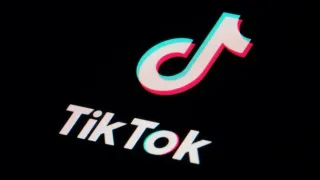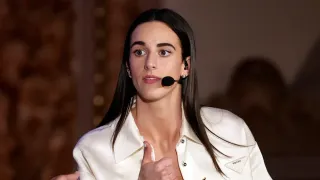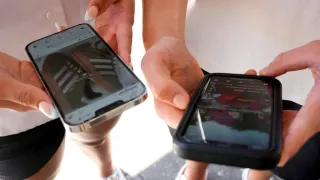July 22, 2017
LGBTs Flagged on Facebook for 'Inappropriate' Content
David-Elijah Nahmod READ TIME: 4 MIN.
Some LGBT community members who have been temporarily banned from Facebook for using what it calls "inappropriate" content say the social media giant could do more to address their concerns.
Bruce Beaudette, a gay San Francisco man, said that he was recently banned from Facebook for one week for posting the word "dyke." A queer history buff, Beaudette shared the cover of an issue of Dyke, a quarterly lesbian magazine that was published in New York City during the 1970s. The cover photo featured five butch women with the caption "Dyke Is Out. Are You?" Beaudette added his own comment: "Dyke should always be out. And yes, I am also always out."
The posting was removed by Facebook. "We removed the post below because it doesn't follow Facebook community standards," stated the message Beaudette received just prior to his banning, during which time he could not post, comment, like posts, or respond to messages. He noted that Dyke magazine is archived at Radcliffe College and the Museum of Modern Art in New York City.
"A human being at Facebook was not against what I posted," Beaudette told the Bay Area Reporter. "Nor do I think that anyone reported me. A computer program flagged and blocked me. A call center and a human operator could figure out the mistake."
Many in the LGBT community have asked Facebook to set up a call center where issues such as these can be resolved without unfairly penalizing someone who has done nothing wrong. Though Facebook has as of yet declined to set up a call center, the company has, according to some, made strides in addressing other issues.
"I am happy with the progress that the #MyNameIs team has made with Facebook," said Sister Roma of the Sisters of Perpetual Indulgence, who's a leader in the #MyNameIs coalition.
Two years ago, the issue generated controversy after activists and others criticized Facebook for its real name policy. Facebook has always required people to use their real, or legal, name. But that has created issues as others have flagged accounts, often those of trans people and drag queens, resulting in account suspensions. Domestic abuse survivors were also affected.
"We got them to meet with us and really understand how our community, specifically LGBTQ people, use the site authentically with names that can't be proven by a government ID or piece of paper," Roma added. "As a result, Facebook changed the 'fake name' reporting process to make it more difficult to report someone. They have also made changes to the appeals process and gone as far as to establish a team specifically assigned to address LGBTQ and other users who check the 'special circumstances' box. Now you can explain who you are and why your identity is authentic."
Roma feels that Facebook remains safe for queer people.
"I know that Facebook embraces diversity and welcomes all users, especially the LGBTQ community," Roma said. "They never had a personal vendetta against LGBTQ people. Unfortunately, it is the Facebook users who attack and harass our community. Facebook has defenses we can use against that type of behavior, including blocking and reporting bad behavior. However, the site, which I believe now boasts 2 billion users, has a lot of work to do recognizing the difference between queer-positive posts that reclaim and honor queer words that can also be used in a hateful and abusive way."
Brooke Oliver is a lesbian attorney who represents Dykes on Bikes. Like Beaudette, Oliver had a comment removed and was banned for using the word "dyke."
Dykes on Bikes, a lesbian motorcycle contingent that traditionally leads the San Francisco Pride parade, is, according to Oliver, a brand known worldwide.
"We're using the word 'dyke' to reclaim it and to take out its sting," Oliver said. "Context is essential. Self-referential speech is political speech and is protected by the Constitution. I think it's important to reclaim these words."
Oliver said that she got through to Facebook attorneys by contacting them via snail mail at Facebook's Menlo Park headquarters. She got a response.
"We are insisting that there be apologies and that they be public," she said. "These are bad business practices."
Other feel that Facebook does not have the community's best interests at heart.
"The negatively impactful prejudice exhibited by Facebook's decision to target and flag our community is a reflection of the prejudice that we experience in our society," said Monica Anderson, aka Kin Folkz, an African-American queer woman.
"Until marginalized TLGBQIA2S folks hold decision-making power at Facebook, or form our own social media platform to rival Facebook, we will always be the last considered when it comes to human rights and the first considered when it comes to tokenism and exploitation," Folkz added, referring to the transgender, lesbian, gay, bisexual, queer, intersex, agender, and two-spirit community.
Lil Miss Hot Mess, a drag performer who was also involved in the real names issue, also thinks that more can be done to protect queers on Facebook.
"Facebook doesn't consider an unsolicited message telling you to kill yourself to be bullying/harassment, surprise surprise," she posted on her page. The B.A.R. was unable to reach Lil Miss for comment.
Beaudette nevertheless said that he feels safe on Facebook, and continues to maintain that a call center would resolve LGBTQ issues quickly and fairly.
"It is frustrating that Facebook chooses to ignore people," he said. "They seem to rely too much on their own cleverness. They could though, staff a call center somewhere in America that is needful of employment opportunities, like Flint, Michigan. Helpful to their users needs like me, and great publicity for them."
While this story was being written, the author was banned from Facebook for one week after being flagged for harassment by Newark, Delaware resident Nancy Kersey, a straight woman. Over a period of years Kersey contacted the author to brag about getting people to unfriend and block him, and claimed to have people monitoring the author's page and report back to her, among other contacts.
In October 2016, Sergeant Bradley Norris of the New Castle County police emailed the author to verify that he had visited Kersey's home and advised her to cease contact with the author.
Facebook spokesman William Nevius and Justin Osofsky, vice president of global operations, did not respond to emails asking how the issues raised by Beaudette or how behavior such as Kersey's might be dealt with.






